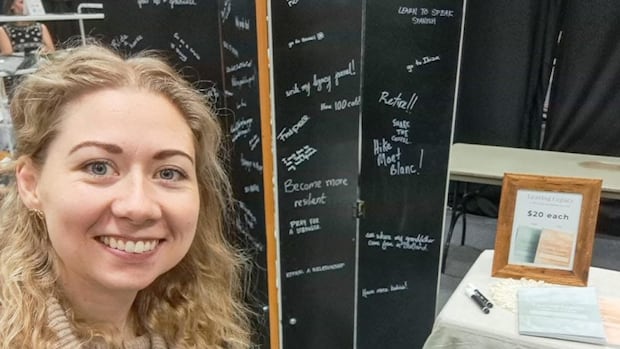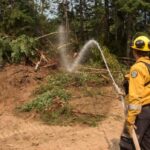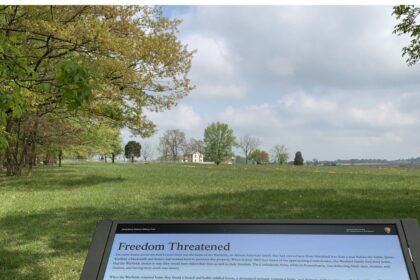New BrunswickNew Brunswick experts in aging, senior care and death say there’s a lot to be gained — including peace of mind and making things easier on your loved ones — by planning ahead for these natural, inevitable phases of life.A nurse, a widow and an age planner share their advice for a good end of lifeJennifer Sweet · CBC News · Posted: Sep 07, 2025 5:00 AM EDT | Last Updated: 2 hours agoJessica Davis, who lives in the Fredericton area, coaches people to have tough conversations about their future care while they’re relatively young and healthy. (Jessica Davis/Facebook)New Brunswick experts in aging, senior care and death say there’s a lot to be gained — including peace of mind and making things easier on your loved ones — by planning ahead for these natural, inevitable phases of life.Many people are reluctant to bring up what they think will be painful topics, such as how they want to be cared for and what arrangements they want carried out after they die, said Jessica Davis, an age planning consultant who lives outside of Fredericton and runs a company called Nestage.But these open discussions can lead to a greater sense of comfort for all parties and smoother family relations, Davis said in an interview with CBC’s Information Morning Moncton.Davis recently held a workshop at the Moncton Public Library to discuss key considerations to approach aging. About 20 people attended the workshop, which was aimed at people who are over 50 or who have parents over that age. Davis told CBC she often hears from people who are worried about their aging parents. She sees her role as helping them talk about what the aging person wants and how the younger person can support them. She’s been interested in this work since she was 19 and moved in with her grandparents, then aged 89 and 92, to be their primary caregiver.At first, Davis thought they should move out of their home in the country and into a care home in a larger community, but the experience of living with them changed her mind.”I really … shifted my perspective on the importance of keeping familiarity as you age and your local ties close to you, and just how powerful that feeling of home is,” Davis said.She has studied gerontology, kinesiology, retirement community management, end-of-life care and home safety and worked in rehabilitation, hospital, care homes and social research.Don’t wait to start talkingNow through her company, which she launched in 2024, she tries to help others prepare for aging in advance.Davis encourages people to start having these conversations when the older adult figure of the family is in their 60s, “or even earlier,” before risk increases of a debilitating medical issue that may impede communication, she said. “We should be talking about these things in our family and saying: ‘If this happens, what’s the game plan?,’ so that we’re not scrambling in the moment, in the middle of all the emotions and all the the heightened crisis situations, that could occur.”Elizabeth Collings, a registered nurse who works for the Nursing Home Without Walls program in Sussex, N.B., wholeheartedly agrees.A youth group organized carnival-type games and activities at a recent event hosted by the Nursing Home Without Walls program in Sussex, N.B. The program supports seniors who live in their own homes. (Submitted by Elizabeth Collings)Nursing Home Without Walls helps seniors still living at home navigate resources that are available to them. Each program site around the province has specific services, based on local needs. In Sussex, these include social and educational events, meals and transportation to medical appointments.As part of their planning, Collings urges people to create an enduring power of attorney. This legal document designates who will act on their behalf if they become incapacitated or hospitalized and can’t pay their bills. Having one in place can make a huge difference for the individual and their family, said Collings.Collings gave the example of a man of about 60 who became suddenly unwell and died before he was able to sign a power of attorney document. The “very unfortunate spouse” was locked out of bank accounts and had a difficult time sorting out things such as the home mortgage, she said.The spouse consequently faced hefty legal fees, which could have been avoided if a power of attorney document been prepared, at a cost as low as $400, said Collings.The nurse estimated that about 85 per cent of the 275 seniors she’s worked with in the past two years have had theirs done. Important questions to considerAnne Marie Hartford, an organizer of death cafes in Fredericton, suggested other important questions that need to be considered.”Am I going to live in a nursing home? Is that for me? And if it’s not, what would be the alternative?,” Hartford said in an interview with CBC.”How about your drivers licence?” “Are you willing to give it up, or do you have to have it wrestled out of your hands?”Hartford has been running death cafes since 2017, when she was researching ways to talk to her children about end-of-life wishes.These loosely structured, free, public discussion groups are intended to help people feel more comfortable talking about death, she said. The next one is planned for Sept. 19, at 1:30 p.m. at the Fredericton Public Library.Anne Marie Hartford organizes semi-regular events in Fredericton called death cafes, where people can talk about topics related to aging and death. (Submitted by Anne Marie Hartford)After the death of her husband in a car accident when he was 45, Hartford was grateful they had previously discussed his wishes.She’s connected her daughter with a death doula because she’d like to die at home, if possible. At-home death is more feasible with support from someone who understands the process, she said.Information Morning – MonctonAging coach helps seniors and their families plan for the challenges of growing olderJessica Davis is a New Brunswick-based age planning consultantGoing back 100 or 150 years, very few people moved out of their family home and into a care home or hospital before they died, Davis said. Even wakes and funerals were held inside the home. As those traditions changed, people became less comfortable with aging and death, she said. “It puts a blanket over the topic and over our eyes,” said Davis. “We are no longer seeing aging and death in the same light that we used to. … We don’t know how to talk about it any more because we’re not used to it.”ABOUT THE AUTHORJennifer Sweet has been telling the stories of New Brunswickers for over 20 years. She is originally from Bathurst, got her journalism degree from Carleton University and is based in Fredericton. She can be reached at 451-4176 or jennifer.sweet@cbc.ca.With files from Information Morning Moncton
Everyone will get older. But experts say not enough people plan for aging and death











